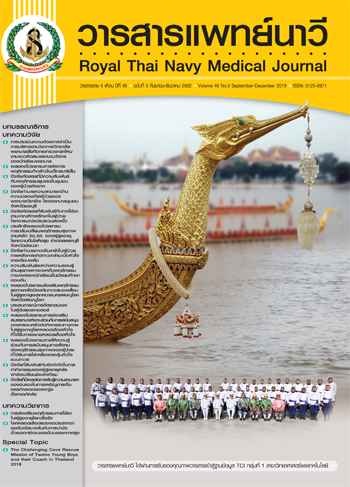The Effect of Education and Social Support Program on Health Behaviors in Patients with Cardiac Permanent Pacemaker
Main Article Content
Abstract
This quasi-experimental research aimed to study the effect of education and social support program on health behaviors in patients with cardiac permanent pacemaker. Patients with cardiac permanent pacemaker were recruited from Cardiovascular Patients’ Ward, King Chulalongkorn Memorial Hospital. They were assigned to the control (n = 22) and experimental (n = 22) groups with matched pair technique by gender, age, and educational level. The control group was a conventional nursing care while the experimental group was treated with given knowledge and social support program. Questionnaires were composed of demographic information, health behavior of patients with cardiac permanent pacemaker, knowledge of health behavior of patients with cardiac permanent pacemaker, and social support questionnaires. All questionnaires were validated by 5 experts with the content validity indexes of 0.89, 0.92, and 0.83, respectively. The internal consistency reliability of all scales were 0.90, 0.74, and 0.81, respectively. Descriptive statistics and t-test were used to analyze the data. The results revealed as the followings:
The mean score of health behavior of the patients with cardiac permanent pacemaker after given knowledge and social support program in the experimental group was significant higher than that in the control group at the significant level of 0.05.
The results of this study recommend to use the education and social support program should be applied to care for patients with cardiac permanent pacemaker to be routine care according to the nursing role.
Article Details

This work is licensed under a Creative Commons Attribution-NonCommercial-NoDerivatives 4.0 International License.
References
Phumphuk S. Emergency in cardiac pacemaker. In: Kritayapong R, Phankingtongkam R, Wongprapaarat N, Maneesai A, editor. Cardiac emergency. 2nded. Bangkok: Mahidol University; 2016. (in Thai).
Sriprasong S. Nursing in patients with cardiac arrhythmia. In: Toopairor P, editor. Nursing in medicine. Bangkok: NP Press; 2010. (in Thai).
Mond HG, Irwin M, Ector H, Proclemer A. The world survey of cardiac pacing and Cardioverter-defibrillators: calendar year 2005 an International Cardiac Pacing and Electrophysiology Society (ICPES) project. Pacing Clin Electrophysiol 2008;31(9):1202-12.
Mond HG, Proclemer A. The 11th world survey of cardiac pacing and implantable cardioverter-defibrillators: calendar year 2009--a World Society of Arrhythmia's project. Pacing Clin Electrophysiol 2011;34(8):1013-27.
Thachinlert B. The development of self-efficacy program in patients with permanent pacemaker in Srinagarind hospital. [Master’ Thesis, Faculty of Nursing]. Khon Kaen University; 2008. (in Thai).
Green JW, Kreuter MW. Health program planning: an educational and ecological approach. 4th edition. New York: Emily Barrosse; 2005.
Chen HM, Chao YF. Change in quality of life in patients with permanent cardiac pacemakers: a six-month follow-up study. J Nurs Res 2002;10(2):143-50.
Ruengdej P. The relationship between self-concept, social support and self-care behavior of patients with permanent cardiac pacemakers. [Master’s Thesis, Faculty of Nursing]. Mahidol University; 1991. (in Thai).
Punkum T, Ua-Kit N. Predicting factor of health behaviors in patients with cardiac permanent pacemaker. Thai Journal of Cardio Thoracic Nursing 2017;28(1):129-41. (in Thai).
Aqeel M, Shafquat A, Salahuddin N. Pacemaker patients' perception of unsafe activities: a survey. BMC Cardiovasc Disord 2008;31(8):1-5.
Palmer SJ. Post-implantation pacemaker complications: the nurse's role in management. British Journal of Cardiac Nursing 2014;9(12):592-8.
Huang LY, Guo SE, Tsai CC, Huang TY. The effectiveness of a systematic patient education intervention on knowledge, attitudes and behavior about self-care in patients with permanent pacemakers. Taiwan Journal of Public Health 2014;33(2):174-8.
Rakhshan M, Hassani P, Ashktorab T, Majd HA. The nature and course of illness perception following cardiac pacemaker implantation: a self‐regulatory approach. Int J Nurs Pract 2013;19(3):318-25.
Malm D, Karlsson J, Fridlund B. Effect of a self-care program on the health related quality of life of patients: a nursing intervention study. Can J Cardiovas Nurse 2007;17(1):15-26.
Mohamed AE, Shreif WI, Mohamed MH, Maaty AR. Effectiveness of educational program on knowledge and practice of patients undergoing permanent pacemaker. IOSR-JNHS 2016;5(6):72-83.
Ghisi GL, Abdallah F, Grace SL, Thomas S, Oh P. A systematic review of patient education in cardiac patients: do they increase knowledge and promote health behavior change. Patient Educ Couns 2014;(95):160–74.
House JS. Work stress and social support. California: Addison - Wesley Publishing; 1981.
Khongseua P, Tantikosoom P, Ua-Kit N. The effects of educative supportive nursing program on dietary behaviors among patients after percutaneous transluminal coronary intervention. Kuakarun Journal of Nursing 2014;21(suppl):168-85. (in Thai).
Burns N, Grove SK. The practice of nurse research: appraisal, synthesis, and generation of evidence. 6th edition. St. Loius (MO): Elsevier Saunders; 2009.
Debski M, Ulman M, Zabek A, Haberka k, Lelakowski J, Malecka B. Gender differences in dual-chamber pacemaker implantation indications and long-term outcomes. Acta Cardiol 2016;71(1):41-5.
Vellone E, Galletti C, Alvaro RR, Sansoni J. Anxiety and depression before and after a pacemaker implantation: a comparative study. International Nursing Perspectives 2008;8(3):93-9.
Srisamai S, Ua-Kit N, Naveecharern R. Selected factors associated with health related quality of life in aortic aneurysm patients after surgery. Songklanagarind Journal of Nursing 2014;34(2):17-38. (in Thai).
Rerkluenrit J, Khwanchai P, Soiorn T. Effects of a supportive educational program on functional status and self-care of persons with heart failure. Rama Nurs J 2012;18(1):102-18. (in Thai).
Semapetch J, Senarak W. The effect of social support program on self-care behavior of acute coronary syndrome patients. Journal of Nursing and Health Care 2014;32(2):31-40. (in Thai).


